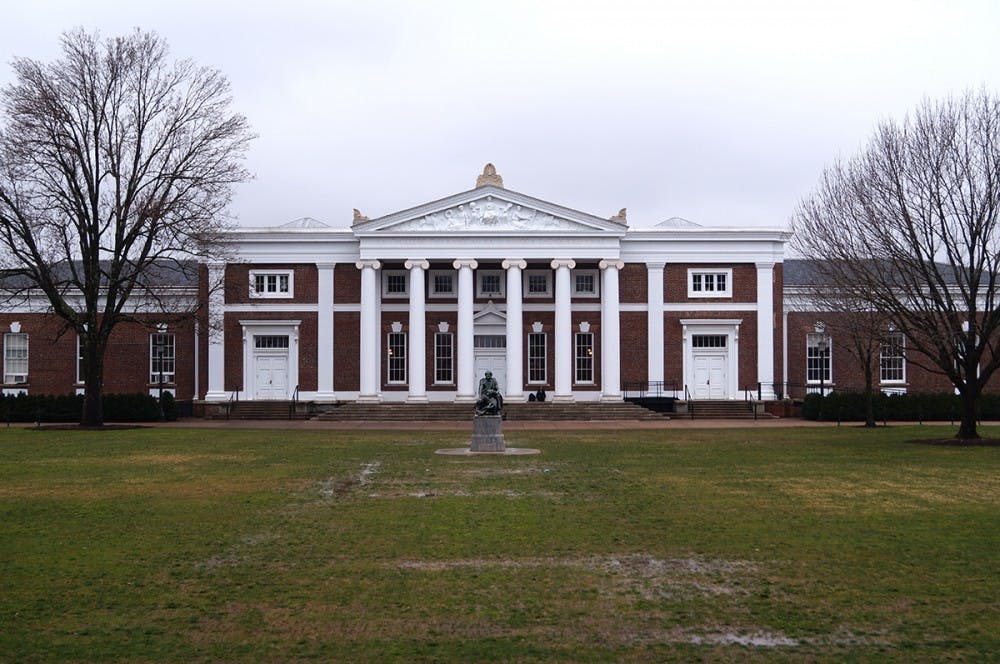Audiences gathered at Old Cabell Hall for the fifth concert in the University’s Chamber Music Series, the penultimate in the series Sunday. Students, families with children and elderly members of the Charlottesville community spent the afternoon immersed in the world of classical music. The series, directed by Jiyeon Choi, a clarinetist and lecturer in clarinet at the University, features performances by the University’s finest classical performers and outstanding guests.
This week’s concert headlined Assoc. Music Prof. Ayn Balija. Balija is no stranger to the stage — she currently resides as the principal violist of the Charlottesville Symphony at the University as well as the violist for the Rivanna String Quartet on Grounds. This performance was centered around Balija and her viola, and featured special guests Jiyeon Choi on clarinet, Assoc. Music Prof. I-Jen Fang on marimba, Music Prof. John Mayhood on piano and Shelby Sender on piano.
The afternoon began with “Concertstück” by Georges Enescu, a simple yet entrancing duet between Balija and Sender. The piano’s classical tone complimented the rich, full sound of the viola quite well, and the two instruments switched back and forth between melodic lines and unifying harmonies. Quick note changes from both violist and pianist built the intensity of the piece.
The program notes for “Concerstück” stated that each instrument was meant to have “equal footing,” which Balija and Sender accomplished with ease. Anyone who thinks playing the viola does not require much physicality has clearly never seen Balija perform. The violist was fully invested in the energy of the piece, with full body movements that mimicked the richness of the music.
A solo moment to shine and a heartfelt exchange followed in the next piece, “On the Wings of Dawn” by composer Judith Shatin. Balija took center stage and the viola’s notes rang out as the only sound in the hall as Shatin herself sat in the audience hearing her arrangement — created specifically for Balija — in its world premiere. At the end of the final note the powerful solo was met with applause and a standing ovation from Shatin, expressing her gratitude for Balija’s beautiful performance.
The next segment of the concert featured three duets between Balija on viola and Fang on marimba. These pieces were relatively shorter than their predecessors, but by no means did that make them less entertaining. The first two pieces, both from Brazilian composer Ney Rosauro, brought a new Latin American sound to the concert.
The first of this series, “Farewell Song,” filled the hall with the sound of somber, beautiful scales, the dark viola taking the melody while bright marimba filled in the background. The next piece, “Reunion’s Dance,” contrasted in both mood and intensity, bringing a lively energy to the room. Each instrument took equal ground in a fascinating call and response that built in intensity as each took turns repeating the melody.
The final duet between Balija and Fang, “Mélodie for Viola and Marimba” by Áskell Másson, rounded out this set with a grand finish. The piece started out with a gentle tenderness and quickly built in a grand arc that eventually settled back to its original softness. This piece illustrated the ultimate communication between musicians, as the audience could see Fang and Balija constantly checking in with one another, making sure they agreed on tempo and intensity. As the piece wound down, Fang switched from using four mallets on the marimba down to two and then no mallets, tapping the keys with only her hands as the music decrescendoed to silence.
Following this set, Sender returned onstage for a final duet with Balija in a miniseries by Luise Adolpha Le Beau. The first of the trilogy, “Nachtstück,” consisted of a powerful, yet light melody, with a bouncier section in the middle. The next piece was entitled “Träumerei,” which translates to “Reverie.” The composition was a flowy nod to composer Robert Schumann’s famous piece with the same title. The final composition closing this set was entitled “Polonaise,” a lively, more upbeat piece than its counterparts.
The most distinct performance of the afternoon came with the final piece. “Disagree!” by composer Miguel del Águila featured Balija, Choi and Mayhood in a rousing ending to the concert. Balija interjected before commencing that she, alongside Choi, had the privilege of performing this piece in Hungary earlier this year. The song commenced with an ear-splitting shriek from the viola, as clarinet and piano mirrored the intensity.
“Disagree!” truly sounded like an argument between instruments — audience members’ heads bounced back and forth from musician to musician, unsure of who held the melody. The disagreement between instruments built in vehemence, and eventually, harmonies erupted as the lines began to find unity. Balija, Choi and Mayhood punctuated the piece with a loud stomp and bright smiles, earning a standing ovation from the audience.
Balija’s performance alongside her guests made a lovely, yet powerful addition to the Chamber Music Series. Audiences have one more chance to attend this series. The final concert will take place Apr. 10 in Old Cabell Hall, and will feature Kelly Peterson Peral, an oboist and lecturer in Oboe at the University.





